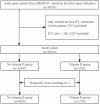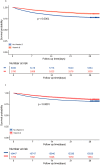Vitamin D supplementation during intensive care unit stay is associated with improved outcomes in critically Ill patients with sepsis: a cohort study
- PMID: 39902186
- PMCID: PMC11788162
- DOI: 10.3389/fcimb.2024.1485554
Vitamin D supplementation during intensive care unit stay is associated with improved outcomes in critically Ill patients with sepsis: a cohort study
Abstract
Background: Patients with vitamin D deficiency are susceptible to increased microbial infection and increased risk of mortality. However, whether vitamin D supplementation would improve their prognosis remains uncertain.
Methods: We conducted a retrospective cohort study using data from MIMIC-IV database, a publicly available database containing clinical information on patients admitted to the ICU at Beth Israel Deaconess Medical Center (BIDMC) from 2008 to 2019. Adult patients with sepsis were included in the analysis. The exposure factor was vitamin D supplementation during the ICU stay. The primary outcome was 28-day all-cause mortality. Both propensity score matching (PSM) and stepwise regression analyses were employed to adjust for potential confounders.
Results: A total of 20230 eligible patients were enrolled in the entire unmatched cohort, and 8710 patients were included in the matched cohort. In PSM analysis, the 28-day all-cause mortality rate was 14.04% (250/1780) in the vitamin D group and 22.31% (1546/6930) in the no vitamin D group. Vitamin D supplementation was associated with decreased 28-day all-cause mortality (HR, 0.56; 95% CI, 0.49-0.64; p < 0.001). Subgroup analyses showed consistent benefits regardless of the baseline vitamin D status (deficiency: HR, 0.70; 95% CI, 0.33-1.50; p = 0.36; insufficiency: HR, 0.10; 95% CI, 0.03-0.34; p < 0.001; sufficiency: HR, 0.33; 95% CI, 0.12-0.88; p = 0.03). Additionally, vitamin D supplementation was associated with decreased ICU mortality (OR, 0.37; 95% CI, 0.29-0.48; p < 0.001) and reduced in-hospital mortality (OR, 0.57; 95% CI, 0.48-0.68; p < 0.001). Sensitivity analysis using the unmatched cohort confirmed these findings (HR, 0.57; 95% CI, 0.43-0.76; p < 0.001).
Conclusions: Vitamin D supplementation may reduce mortality in critically ill patients with sepsis. However, further high-quality prospective studies are still needed to validate these findings.
Keywords: critical illness; microbial infection; mortality; sepsis; supplementation; vitamin D.
Copyright © 2025 Li, Zhao, Ren, Chen, Zhang, Wang and Xie.
Conflict of interest statement
Author QR was employed by company Advertising Center. The remaining authors declare that the research was conducted in the absence of any commercial or financial relationships that could be construed as a potential conflict of interest.
Figures





Similar articles
-
Vitamin D Supplementation during Intensive Care Unit Stay Is Associated with Improved Outcomes in Critically Ill Patients with Sepsis: A Cohort Study.Nutrients. 2023 Jun 28;15(13):2924. doi: 10.3390/nu15132924. Nutrients. 2023. PMID: 37447250 Free PMC article.
-
Vitamin D supplementation can improve the 28-day mortality rate in patients with sepsis-associated acute kidney injury.Ren Fail. 2024 Dec;46(2):2431632. doi: 10.1080/0886022X.2024.2431632. Epub 2024 Nov 25. Ren Fail. 2024. PMID: 39584485 Free PMC article.
-
Association Between Dexamethasone and Delirium in Critically Ill Patients: A Retrospective Cohort Study of a Large Clinical Database.J Surg Res. 2021 Jul;263:89-101. doi: 10.1016/j.jss.2021.01.027. Epub 2021 Feb 24. J Surg Res. 2021. PMID: 33639374
-
Evaluation of Vitamin D Supplementation in Critically Ill Patients-A Narrative Review of Randomized Controlled Trials Published in the Last 5 Years.Nutrients. 2025 Feb 27;17(5):816. doi: 10.3390/nu17050816. Nutrients. 2025. PMID: 40077686 Free PMC article. Review.
-
Vitamin D supplementation for managing COVID-19 in patients with vitamin D deficiency: a systematic review and meta-analysis of randomised controlled trials.BMJ Open. 2025 Mar 26;15(3):e091903. doi: 10.1136/bmjopen-2024-091903. BMJ Open. 2025. PMID: 40139702 Free PMC article.
References
-
- Amrein K., Schnedl C., Holl A., Riedl R., Christopher K. B., Pachler C., et al. . (2014). Effect of high-dose vitamin D3 on hospital length of stay in critically ill patients with vitamin D deficiency: the VITdAL-ICU randomized clinical trial. Jama 312, 1520–1530. doi: 10.1001/jama.2014.13204 - DOI - PubMed
-
- Amrein K., Sourij H., Wagner G., Holl A., Pieber T. R., Smolle K. H., et al. . (2011). Short-term effects of high-dose oral vitamin D3 in critically ill vitamin D deficient patients: a randomized, double-blind, placebo-controlled pilot study. Crit. Care (London England). 15, R104. doi: 10.1186/cc10120 - DOI - PMC - PubMed
MeSH terms
Substances
LinkOut - more resources
Full Text Sources
Medical
Miscellaneous

